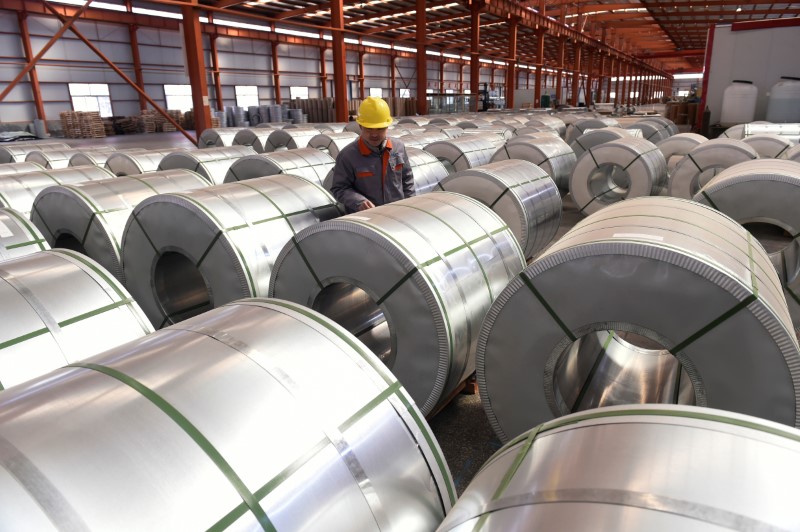(Bloomberg) -- Zhang Shiping, the industrialist who hauled cotton bales in rural China before building a multi billion-dollar empire spanning metal to textiles to electricity, has died. He was 73.
Zhang, the board chairman of China Hongqiao Group Ltd., died Thursday, according to a company filing to the Hong Kong stock exchange. A veteran Communist Party member, he made full use of the market reforms ushered in by former leader Deng Xiaoping to create not one, but two world-class businesses.
He became the richest person in the eastern province of Shandong and was China’s 36th-wealthiest, with a net worth of $4.7 billion, according to the Bloomberg Billionaires Index.
Born in November 1946 in Weiqiao, a town in Shandong’s Zouping county, Zhang at 19 joined some 16 million youth sent to the countryside to counter the “pro-bourgeois” thinking perceived to be prevalent during Mao Zedong’s Cultural Revolution.
That put the Anhui University of Finance and Economics graduate in a prime spot to take advantage of China’s transition from the chaos resulting from the sociopolitical movement, and to make his first fortune in cloth.
At 35, Zhang was made general manager of Zouping’s No. 5 Cotton Ginning Plant in 1981 -- the third year of the opening of China that, over three decades, turned an impoverished nation into the world’s second-largest economy. Zhang and other managers established their own cotton-processing business, Weiqiao Textile Co., in 1994.
Hobbled by an unreliable and costly electricity supply, Zhang built a coal-fired power plant in 1999, undercutting a state-owned generator and enabling his business to thrive, eventually building it into the world’s largest cotton-yarn and denim maker. Zhang sold Weiqiao Textile shares to the public in Hong Kong in 2003.
Aggressive Expansion
By then, he was harnessing his power-plants’ excess energy for a completely new enterprise: aluminum production. The surprise expansion in 2002 of Shandong Hongqiao, the trouser manufacturing and distribution company Zhang founded in 1994 (and later renamed China Hongqiao Group Ltd.), led to an aggressive expansion.
The company added 6 million tons of primary aluminum production capacity in seven years through 2017, overtaking Russian titan United Co. Rusal and Chinese government-owned giant Aluminum Corp. of China Ltd. to become the largest producer in the world.
By trucking molten metal in huge crucibles direct to customers, Hongqiao could leapfrog a section of the supply chain that shipped solid ingots requiring reheating. Such innovations made Hongqiao the world’s most profitable aluminum smelter, out-competing state-run and overseas producers that had long expected China to become a big net importer.
Led by Hongqiao and other emerging powers such as its neighboring Shandong Xinfa Aluminum Electricity Group, China’s total aluminum output almost tripled during the past decade, while output elsewhere was largely stagnant and many producers shut smelters to curb losses. That stoked trade tensions, with China’s exports the subject of multiple trade complaints worldwide. Aluminum joined steel as the first two industries to get tariff protection under President Donald Trump.
Hongqiao and Weiqiao employ about 100,000 people combined, according to the Hong Kong-traded companies’ most recent filings. Hongqiao’s initial public offering, in 2011, attracted billionaires Li Ka-Shing, Cheng Yu-Tung and Joseph Lau as investors. The company invested in bauxite mines in Guinea, leading a tilt toward the African nation that now accounts for half China’s imports of the aluminum raw material, up from nothing three years ago.
Hongqiao shares rose 0.2% to HK$5.51 (70 cents) on Friday, while Weiqiao was steady. Zhang made an invaluable contribution to the success of the companies during his tenure, according to statements from the companies. Hongqiao said it will hold a board meeting to elect a new chairman as soon as possible.
Production Cutbacks
Hongqiao’s expansion was hit by a research report that questioned his group’s famously low costs and President Xi Jinping’s supply-side structural reforms, which aim to reshape basic industries like steel and aluminum. Revenue last year fell 8% as the company responded to a government-guided cutback campaign by closing down some production lines.
Hongqiao currently operates 6.5 million tons of production capacity after shutting down 2.7 million tons under the government’s requirement, Guotai Junan Securities analyst Kevin Guo said in a note in April. Total production capacity was expected to remain unchanged this year, while primary aluminum output was seen at 6 million tons and keeping stable in the future, Guo said. Having hit a ceiling at home, the company is looking overseas, with plans for an aluminum smelter in Indonesia.
Zhang was known for his diligence by starting work and conducting daily meetings at 6:30 a.m., as well as his cautiousness in business by saying he would never invest in residential housing or commodities derivatives trading. In 1995, he was recognized by the Chinese Communist Party as a “National Model Worker,” for exhibiting traits appropriate to the ideal of the socialist worker.
Zhang is survived by his wife, Zheng Shuliang, and his son Zhang Bo, who took over overseeing the family business last year and has been Hongqiao’s chief executive officer since 2011, and by daughters Zhang Hongxia and Zhang Yanhong, who chair the textile business and an industrial park, respectively.
